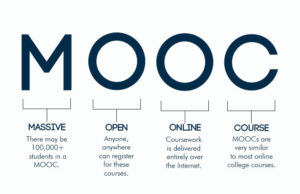First of all, I wanted to use some open-source programmes to do the video, I was playing a little with OpenShot and Kazam, sadly my laptop died finally this week, and I needed to find other ways to record last minute. You will see in the video that appears the name of my husband… Long story short, I used his work laptop and an internal tool to record and his name is everywhere… sorry about.

Find here the summary of the main ideas of the video, and the questions I wanted to raise. I know that 16 minutes of a not very fluid video are difficult to swallow 🙂
Structure, design elements:
- It has all the ingredients you can expect from a MOOC
- Overall, the platform has all the requisites to make good usability, even though I found some elements that bothered me. Constant notifications are visible that I am not able to close.
- It has a free and certification option, but I am disappointed by the fact that audit access expires. When I enrol to a MOOC is because I want to check the information, and kind of keep it, like a book, something that is in my “virtual library” and I am able to check it when needed.
- Content is correct, there is a clear lineal structure and video content is clear enough.
- I am missing more clear objectives and information about the topics that you will be focused on during the course.
- Information about the teacher and staff + Requirements of the programme, very helpful before enrolling to the course.
Thoughts and questions:
- What is the framework that institutions work with?
- Different institutions have access to different frameworks? more resources are given by the platform?
- Is the data collected really useful and used to design and create the course?
- By definition MOOCs has a massive audience, building a community and social network is not something expected, isn’t it? This probably clashed with part of the philosophy behind “open”.
- How and Who is marking the quality baseline? in big platforms like edX or Coursera, are the courses being tested/rated by someone before going online?
- Ideas of why people enrol to a MOOC: have access to resources, information and materials? curiosity?, check options to find areas of interest?, first step to making a career change, find a community?
- Value of the programme. In order to get a certification sometimes is enough paying by the course. There a diverse kind of evaluations, some courses offer a better way to check progress. True/False or more complex questionaries, Peer review or just click to checkmark. How can we be sure that someone that has taken the course has the knowledge? Is the credibility of the platform enough?
On the other hand, I found the post I wrote last year when I was attempting to do the course for the first time. Find the text here, in case you are interested, I realise now it was not a deep analysis…
Knox, J. (2013). The limitations of access alone: moving towards open processes in education. Open Praxis, 5(1), pp. 21-29.